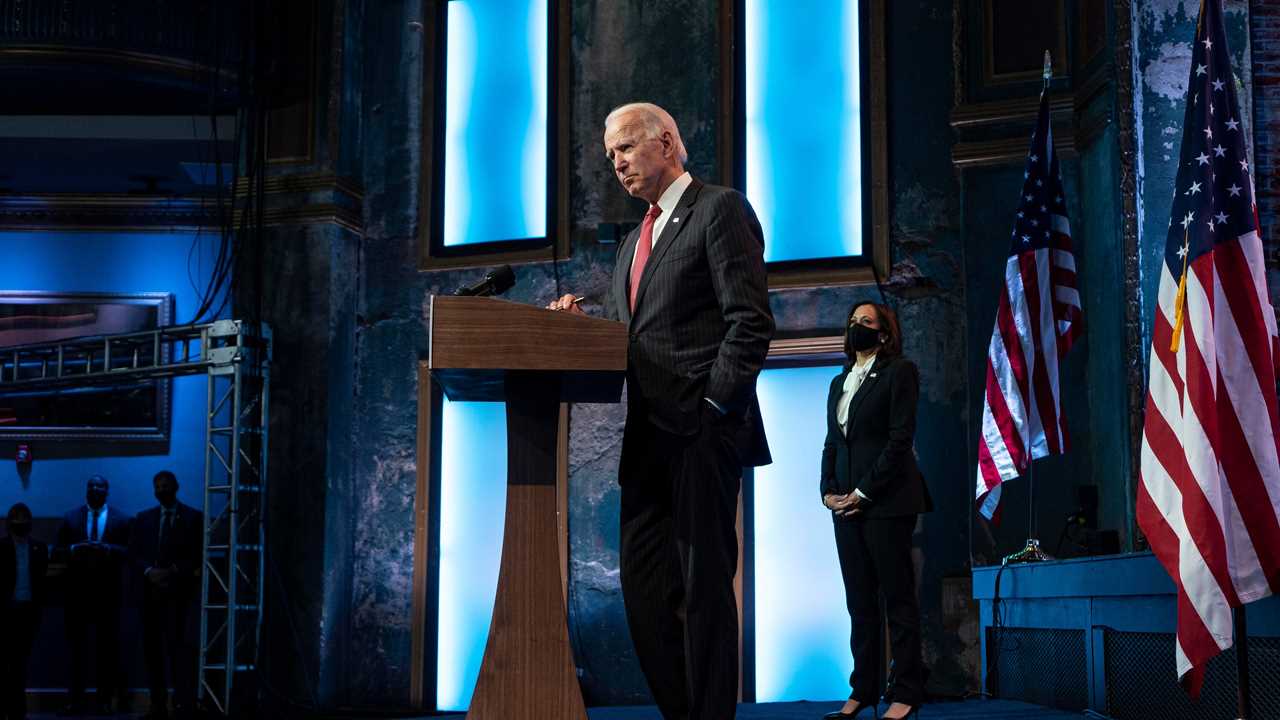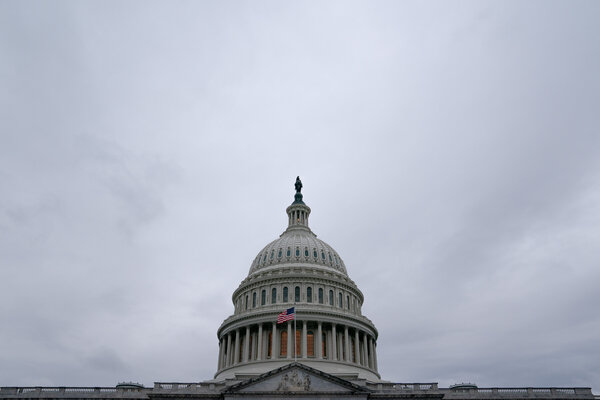
WASHINGTON — Advisers to President-elect Joseph R. Biden Jr. are planning for the increasing likelihood that the United States economy is headed for a “double-dip” recession early next year. They are pushing for Democratic leaders in Congress to reach a quick stimulus deal with Senate Republicans, even if it falls short of the larger package Democrats have been seeking, according to people familiar with the discussions.
Until now, Mr. Biden, Speaker Nancy Pelosi of California and Senator Chuck Schumer of New York, the Democratic leader, have insisted that Republicans agree to a spending bill of $2 trillion or more, while Senator Mitch McConnell of Kentucky, the majority leader, wants a much smaller package. The resulting impasse has threatened to delay additional economic aid until after Mr. Biden’s inauguration on Jan. 20.
Many of the president-elect’s advisers have become convinced that deteriorating economic conditions from the renewed surge in Covid-19 infections and the looming threat of millions of Americans losing jobless benefits in December amid a wave of evictions and foreclosures require more urgent action before year’s end. That could mean moving at least part of the way toward Mr. McConnell’s offer of a $500 billion package.
But top Democrats remain publicly adamant that Republicans need to move closer to their opening offer of $2.4 trillion. Mr. Biden, Ms. Pelosi and Mr. Schumer have given no public indication of how much they are willing to scale back their ambitions in order to reach a deal with Mr. McConnell, arguing that the Republican leader has not been willing to compromise.
“The Covid-19 pandemic and economic recession will not end without our help,” Ms. Pelosi and Mr. Schumer wrote in a letter this month, asking Mr. McConnell to resume negotiations. “It is essential that this bill have sufficient funding and delivers meaningful relief to the many Americans who are suffering.”
Mr. Biden’s team is also considering a range of other policy options for fighting a renewed downturn and the prospect of rising unemployment when he takes office, according to the people familiar with his plans. Some of them, like a sweeping spending bill that includes all or large parts of his campaign proposals for infrastructure, could depend on Democrats winning Senate control in two special elections in Georgia in January.
Others would not require Congress. Mr. Biden’s aides have weighed having the president-elect announce in the coming weeks that he will sign executive orders on his first day in office extending moratoriums on evictions and foreclosures, and deferrals of some student loan payments that are set to expire at the end of the year, the people familiar with the discussions said. He could also announce that he will sign an order providing a more gradual schedule for repayment of payroll taxes that some employers, including the federal government, had deferred into 2021 under an executive order issued by President Trump.
Such orders could lessen or avoid an economic cliff of expiring protections for renters, homeowners and some borrowers, which experts fear could hasten an economic contraction.
The Biden team is also exploring how to circumvent a last-minute move by the Trump administration to end Federal Reserve lending programs that have helped stabilize markets by requiring the central bank to return hundreds of billions of dollars to the Treasury Department, according to the people familiar with the discussions. One possibility would be for Mr. Biden’s Treasury to reissue that money to the Fed under new parameters meant to encourage more aid to small and medium-sized businesses than previously supplied.
But the most important measure could be quick congressional approval of a stimulus bill.
“There needs to be emergency assistance and aid during the lame-duck session to help families, to help small business,” Jen Psaki, a Biden transition aide, said on Friday before a meeting with Mr. Biden, Vice President-elect Kamala Harris, Ms. Pelosi and Mr. Schumer. “There’s no more room for delay, and we need to move forward as quickly as possible.”
A readout from the meeting said Mr. Biden and the other Democrats “agreed that Congress needed to pass a bipartisan emergency aid package in the lame-duck session” but did not indicate what size package was warranted.
The economy returned to growth in the second half of this year after falling into a sharp and rapid recession. But sluggish retail sales growth in October, rising claims for unemployment insurance last week and a multiweek decline in employment and hours worked at small businesses nationwide have increased the odds that the economy could tip back into recession.
“The pandemic is raging, and it’s starting to do damage again,” said Mark Zandi, an economist at Moody’s Analytics.
Economists close to Mr. Biden and his campaign are circulating a spreadsheet containing new projections from Mr. Zandi, which predict that the economy will begin to shrink again in the first half of next year unless lawmakers break a prolonged impasse in stimulus talks.
Such a reversal would result in what economists call a double-dip recession, even as pharmaceutical companies prepare to distribute Covid-19 vaccines that lawmakers and economists hope will curb the pandemic and jolt the economy back toward rapid growth late next year or in 2022. Companies would shed 3 million jobs in the first half of 2021, Mr. Zandi projected, and the unemployment rate would climb from its current rate of 6.9 percent back to nearly 10 percent.
Jared Bernstein, an economist at the Center on Budget and Policy Priorities who was part of Mr. Biden’s inner circle of economic aides in the campaign, said that “speed, size and composition are all important” in a stimulus agreement, “but speed is especially important.”

A dispute over the size of the package has stalled talks for months. Democrats have rejected multiple Senate Republican proposals — the latest at about $500 billion — as insufficient to address the economy’s needs, particularly because they do not include money for state and local governments to plug budget holes and avoid public-sector layoffs. Mr. Zandi said that such a package “maybe barely gets you through to a vaccine” but risks running out when the economy still needs help.
Several Republicans have expressed wariness about spending much more, revisiting concerns about the national debt and insisting that the economy is improving.
“We want to reach agreement on all the areas where compromise is well within reach, send hundreds of billions of dollars to urgent and uncontroversial programs, and let Washington argue over the rest later,” Mr. McConnell said in a speech on the Senate floor this week, deriding the Democratic offer. “By playing all-or-nothing hardball with a proposal this radical, our colleagues have thus far guaranteed that American workers and families get nothing at all.”
The legislative window before the start of the next Congress in January is quickly tightening, leaving many skeptical that a stimulus package could be passed before the end of the year. Most of the discussion around spending has centered on avoiding a government shutdown and approving the necessary dozen annual spending bills. About one week of scheduled legislative days remain, during which lawmakers will need to pass legislation to fund the government beyond Dec. 11. It is unclear whether either chamber will remain in Washington if that deadline is met, particularly when Capitol Hill is struggling to stem the spread of the coronavirus among the rank and file.
Economists are increasingly stressing the need for lawmakers to act quickly, even if that means reaching agreement on smaller package. A bipartisan group convened by the Aspen Institute’s Economic Strategy Group — including former Treasury secretaries under Democratic and Republican administrations — urged lawmakers on Thursday to approve a package that includes aid to small businesses, individuals and state and local governments, saying the economy “cannot wait until 2021” for relief.
“What I’m really worried about is the millions of people who are going to be without food or without a home during the winter,” said Melissa S. Kearney, the economist who directs the strategy group. “That level of individual suffering, really, to me, should be everyone’s priority and move them past their political differences.”
Nicholas Fandos and Thomas Kaplan contributed reporting.






